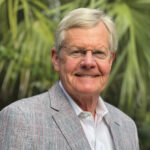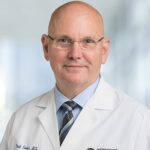Treatment Options for Androgen Deprivation Therapy
In a program supported by Verity Pharmaceuticals, E. David Crawford, MD, Editor-in-Chief of Grand Rounds in Urology and Professor of Urology at the University of California, San Diego, discusses reinforcing consistent testosterone suppression in ADT and the role of triptorelin with Scott B. Sellinger, MD, President of Advanced Urology Institute and a Partner at Southeastern Urological Center in Tallahassee, Florida, and Paul R. Sieber, MD, FACS, President of Keystone Urology Specialists in Lancaster, Pennsylvania. They discuss the history of different forms of androgen deprivation therapy (ADT), go into detail about the potency and effectiveness of the luteinizing hormone-releasing hormone (LHRH) analog triptorelin, and argue for the importance of regularly testing T and ensuring compliance to dosing schedules to avoid T flare.
Dr. Crawford begins by asking Drs. Sellinger and Sieber what the goal of ADT is, and whether there are any other goals of ADT, to which they respond, respectively: to lower testosterone (T), and to monitor the patient beyond just their prostate specific antigen (PSA) level. Dr. Crawford then briefly summarizes the history of ADT and describes the different current options for hormone therapy, including estrogens, surgical castration (i.e., orchiectomy), luteinizing hormone-releasing hormone (LHRH) agonists, LHRH antagonists, antiandrogens, combined androgen blockade, and 17,20 lyase inhibitors. He notes that orchiectomy, once called the “gold standard” is not done very often anymore, that estrogens are associated with cardiovascular risks, and that antiandrogens are associated with gynecomastia.
Dr. Crawford proceeds to go into detail about the established survival benefits of adding in an antiandrogen to an LHRH compound, but notes the problem of testosterone escapes. Dr. Sellinger then explains that there is mounting evidence supporting a new castration level of <20 ng/dL, and explains that late dosing is a problem since inconsistent T levels lead to escapes. Speaking as a practitioner, Dr. Sieber underscores that late dosing is extremely common. Dr. Sellinger also argues that it is necessary to test more regularly for T. He then discusses the mechanism of action of triptorelin, a particularly potent LHRH analog, and compares it to degarelix and relugolix. Dr. Sieber goes further into the history of triptorelin which he notes was registered the same year as leuprolide and has been more widely used in Europe than in the US. Dr. Sieber highlights research that indicates triptorelin is more effective at maintaining low levels of T than leuprolide.
The program concludes with key take-home messages, and Drs. Crawford, Sellinger, and Sieber emphasize that not all forms of ADT are equally effective, and that monitoring patients to ensure they are complying with treatment and keeping T levels low is necessary.
We have provided the presentation in PDF form below. To navigate, use the controls on the lower-left corner of the slides.
Verity.v.1.25.22_MS
Supported by







